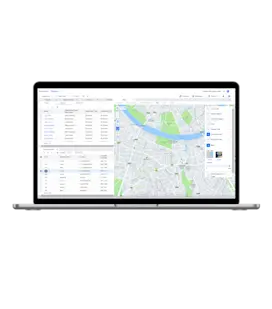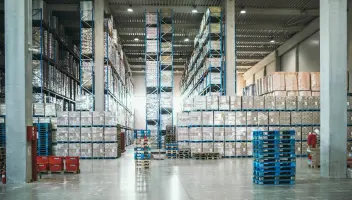Rethinking Lean Logistics: Making the Most of Your Fleet
Rethinking Lean Logistics: Making the Most of Your Fleet
Rethinking Lean Logistics: Making the Most of Your Fleet
16 Mar 2022
Jim Endres
We have all heard about the global supply chain crisis and various theories about how and why it happened. Many analysts have tried to place the blame on the lean way of organizational thinking. It’s true that at the beginning of the pandemic, massive shortages of essential products, like toilet paper, hand sanitizer and masks, caused panic-induced hoarding and exacerbated the issues. But throwing the blame on a production theory that has worked for thirty years seems short-sighted. Lean production models do work—but what the pandemic has taught us is that we need to rethink how lean methodology will translate to the modern supply chain.
For logistics companies, lean principles mean focusing on continuous improvement and lead-time reduction. In the following article, we will examine lean theories and how they are still viable, even in the face of severe supply-chain concerns.
Intro to Lean Methodology
The idea of lean thinking has been around for decades. First introduced by Toyota as a means of making production more efficient, it was popularized in the 90s after the book, Lean Thinking, was released. The basic principle is this: lean thinking is a systematic approach to reduce or eliminate wasteful steps in any process and thus ensure high quality and customer satisfaction. It embraces the idea of continually enhancing processes and maximizing customer value.
For logistics companies, this means operating on a continuous improvement loop with your drivers and your operations. It means proactive problem solving when feasible and using issues as a means to develop the business. It allows you to create an efficient, agile enterprise by maximizing the use of the resources you already have and eliminating redundancies.
Lean Under Fire
As the pandemic unfolded and the global supply chain disintegrated, industry experts stated that lean inventory methods might have been to blame for the supply chain shortages. While it’s convenient to try to find a single scapegoat for the continuing woes of the global supply chain, blaming a successful theory seems myopic. The fact is that the pandemic spotlighted issues that had been there all along.
In reality, the goal of a lean supply chain is to optimize inventory by maintaining the correct levels to meet consumer demand. Detractors would argue that the lack of supplies in the early days of the pandemic showed the flaws in keeping lean inventory, but the truth is that no one could have predicted and stocked the right amounts of supplies to meet such an unprecedented black swan event.
If you follow that argument to its logical conclusion, all supply chain issues could be solved simply by using “buy to order” (BTO) principles. While that might work in an ideal world, how would that have unfolded at the height of the pandemic, when consumers were panic-buying everything from sanitizer to knockoff N-95 masks? The answer to that question is that it would have resulted in utter chaos as every supplier and distributor scrambled to change their inventories and logistics companies rushed to get the orders out.
In the face of intense scrutiny, the question remains—is lean thinking still feasible? The answer is yes—particularly with the right technology to support it. For your growing fleet, here is a primer on how to make lean logistics work for you—even as supply chain problems continue to unfold.
The principle here is rethinking what lean methods are, and how they will work as logistics continues to evolve.
Rethinking Lean Logistics: Making the Most of Your Fleet
Lean logistics is an offshoot of the lean inventory theory. For fleet managers, it applies to recognizing and eliminating wasteful activities from the supply chain. The key is improving your organization at all levels—and for that, you need technology. You cannot simply extend lead times and hope that your customers will understand—they won’t. Nor can you reduce your fleet to try and reduce the impact on the balance sheet. Instead, the focus needs to be on improving the overall processes and efficiency of your fleet. For that, you need route optimization software.
Your main focus to stay competitive needs to be on lead time reduction. That is the principle of lean logistics. Route optimization software improves fleet efficiency and reduces costs. It helps your team complete deliveries on time, in full all while managing all the countless, complex variables of a logistics operation.
For logistics companies, eliminating waste is a different concept than it is for manufacturers or distributors. Waste for logistics companies is all about time and miles. If your team isn’t maximizing the time they spend on the road, they aren’t achieving lean principles. Lean logistics depends on the ability to adapt and improve as the market and conditions change. With the right routing optimization software, you can quickly adapt delivery operations amid unexpected changes, whether it be due to the pandemic or a last-minute change to a customer’s order.
To stay competitive, logistics businesses need to switch quickly to any kind of delivery. They need to incorporate new safety protocols and respond to changes. Lean logistics focuses on a continuous improvement loop, which smart logistics companies can achieve by incorporating driver feedback into an analysis of planned vs. actual route information. As the software adjusts to your fleet’s specific structure, it can analyze various what-if scenarios and help you reduce fleet numbers, change up the vehicle mix, or add another distribution center. Whatever scenario you can dream up to make your fleet perform better, route optimization software can help you achieve.
The result? Lead times shrink, drivers get home faster, and your vehicles need less fuel and less maintenance. Talk about lean logistics.
Do you want to know more about optimizing your fleet and achieving lean logistics? Contact us now to find out how our industry-specific routing and scheduling software, Aptean Routing & Scheduling, can help.
Related Articles


Ready to start transforming your business?
We've got the specialised TMS solutions you need to conquer your industry challenges.






